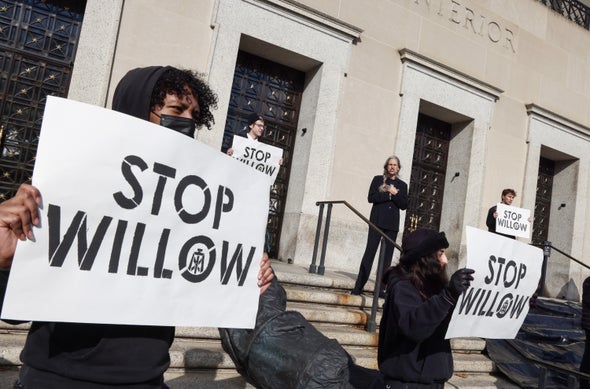CLIMATEWIRE | Environmentalists filed a lawsuit Tuesday against the Biden administration’s approval of ConocoPhillips’ Willow project, marking a new stage in the fight over drilling in the National Petroleum Reserve-Alaska.
The hotly contested $8 billion project opens three new drilling areas in the remote wilderness of Alaska's western North Slope and is estimated to be capable of producing about 600 million barrels of oil over its three-decade lifespan.
The lawsuit, filed by Trustees for Alaska on behalf of a coalition of environmental and Indigenous groups, called on the U.S. District Court for the District of Alaska to scrap the approval because the federal government failed to consider the project's indirect and direct climate risks, as well as harm to wildlife such as denning polar bears and subsistence hunting.
“The Biden administration’s approval of the ConocoPhillips Willow project makes no sense for the health of the Arctic or the planet and comes after numerous calls by local communities for tribal consultation and real recognition of the impacts to land, water, animals, and people," said Siqiñiq Maupin, executive director of Sovereign Iñupiat for a Living Arctic (SILA), in a statement.
SILA, along with the Alaska Wilderness League, Environment America, the Northern Alaska Environmental Center, the Sierra Club and the Wilderness Society, are all parties to the lawsuit.
The groups claimed that the Bureau of Land Management's approval of Willow did not take the required "hard look" under the National Environmental Policy Act, and violated provisions of the Naval Petroleum Reserves Production Act, the Alaska National Interest Lands Conservation Act, procedural law and other federal statutes.
"These laws require consideration of alternatives and thorough, transparent, and careful analysis of the impacts of ConocoPhillips’ proposal by BLM. BLM violated these laws by failing to consider reasonable alternatives that would lessen the impacts to the Reserve," Trustees for Alaska told the court. The lawsuit also alleges the Fish and Wildlife Service acted arbitrarily and capriciously by finding the project did not adequately consider the risk to polar bears from the oil and gas development.
The challengers further alleged that the Biden administration's environmental review did not respond to all the concerns raised by Judge Sharon Gleason of the U.S. District Court for the District of Alaska in an 2021 order blocking the project. The Trump administration had originally given ConocoPhillips the green light for five drilling areas in 2020, as part of a push to expand domestic fossil fuel production under its energy independence agenda.
Gleason, who was appointed under the Obama administration, had rejected Willow in part for failing to adequately consider alternatives or to consider options that were "maximally protective" to an ecologically important area for waterfowl and caribou around Teshekpuk Lake.
BLM released a final record of decision Monday in response to the 2021 court order, which reduced the overall size of the ConocoPhillips project down to three well sites, including up to 199 oil wells.
ConocoPhillips praised the project’s approval Monday, saying it would help create union jobs and benefit Alaska Native communities (Greenwire, March 13).
“Willow fits within the Biden Administration’s priorities on environmental and social justice, facilitating the energy transition and enhancing our energy security,” said Ryan Lance, ConocoPhillips’ chair and CEO, in a statement.
The project also is backed by Alaska’s congressional delegation, who said in a statement Monday that the project would have economic benefits. Interior does not comment on pending litigation.
The new lawsuit charges that the Biden administration continued to consider alternatives that included infrastructure in the Teshekpuk Lake and Colville River special areas.
The groups quoted BLM as claiming in its final record of decision that excluding these areas from development would "not meet the Project's purpose and need and would strand an economically viable quantity of oil."
The lawsuit also notes that the Biden administration's own analysis had found that its preferred alternative for the project would "not result in a substantial reduction in direct impacts on Nuiqsut subsistence harvesters."
Earthjustice and the Center for Biological Diversity followed on the heels of Trustees for Alaska with its own federal legal challenge Tuesday, raising similar claims against the Biden administration.
Their lawsuit also claimed NOAA Fisheries had failed to consider the impact of greenhouse gas emissions on ringed seals and bearded seals.
“There is no question that the administration possessed the legal authority to stop Willow — yet it chose not to. It greenlit this carbon bomb without adequately assessing its climate impacts or weighing its options to limit the damage and say no," said Earthjustice attorney Erik Grafe in a statement.
"We are committed to ensuring that the administration follows the law and ultimately makes good on this promise for future generations,” the statement said.
This story also appears in Energywire.
Reprinted from E&E News with permission from POLITICO, LLC. Copyright 2023. E&E News provides essential news for energy and environment professionals.


